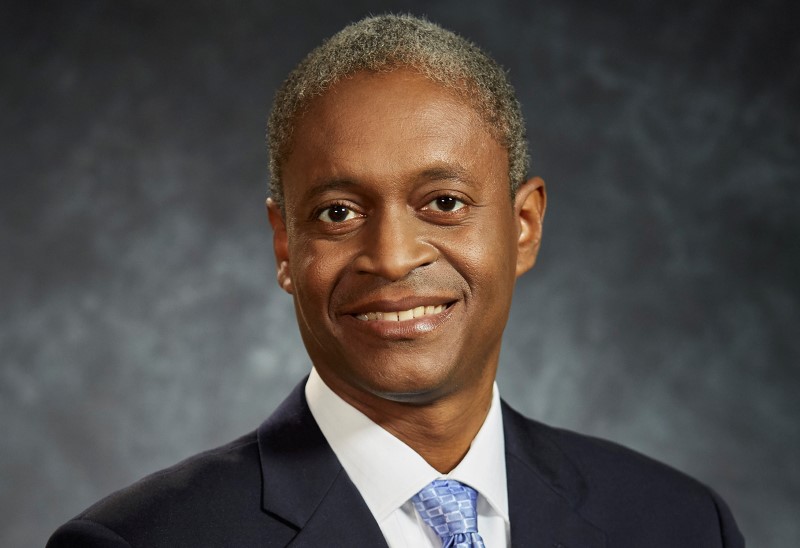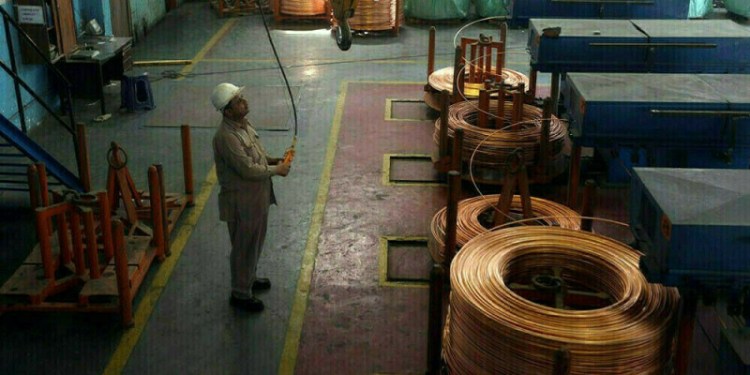 © Reuters. President of the Federal Reserve Bank of Atlanta, Bostic, seen in this handout photo
© Reuters. President of the Federal Reserve Bank of Atlanta, Bostic, seen in this handout photoFORT LAUDERDALE, Fla. (Reuters) – Proposed U.S. tariffs and possible global retaliation to them could undercut economic growth and force the Federal Reserve to slow the pace of interest rate increases, Atlanta Fed President Raphael Bostic said Wednesday in one of the sharpest responses to the proposal yet from a U.S. central banker.
Recently enacted tax cuts raised Fed forecasts for growth and were “forcing us to more aggressive policy,” Bostic told reporters after a business event. “The trade stuff is uncertainty in the other direction. And what I don’t have a good sense of is, if you did an accounting, how much the upside uncertainty is fully offset by the trade uncertainty, or does it overshoot such that we might want to revise our forecast downward.”
The Fed is expected to raise interest rates three times this year, including at its next meeting in two weeks. It will also release fresh economic forecasts for the first time since December.
The intervening weeks have seen dramatic change in the economic landscape – a $1.5 trillion tax cut, proposals for fresh fiscal stimulus unusual in a strong and growing economy, and now the prospect of global trade tensions that may disrupt the recovery.
The tax cuts and higher government spending led many private sector analysts to anticipate the Fed would ultimately raise rates four times this year.
Bostic, a voting member of the Fed’s policy committee this year, is the first Fed member to suggest the proposed trade rules could ripple through the global economy so forcefully it pushes the central bank to slow the pace of rate increases.
His colleagues, including Chairman Jerome Powell, have spoken in general terms about the ills of protectionism and the benefits of trade, but said they were not yet changing their outlook. Bostic too said he is taking a “wait and see” approach as Trump prepares to impose duties of 25 percent on imported steel and 10 percent on imported aluminum.
But he also acknowledged in detail the broader risks of a trade war, as well as the uncertainty now surrounding the Trump administration’s economic policy with the departure of economic adviser Gary Cohn.
Any business involved in international trade “could become part of the story,” Bostic said.
“The U.S. in this latest round has identified aluminum and steel as issues. Europe has signaled they would hit a whole host of other products that are not aluminum or steel. There is just not certainty as to which products are going to get pulled into this,” Bostic said. “Anyone who is engaged in any kind of international trade space has got to be concerned.”
The stock market, Bostic said, had enjoyed a “considerable” move higher that was out of line with business fundamentals, driven by the psychology surrounding Trump’s election.
A global trade disruption, he said, could be the sort of event that brings markets back to reality.
“What does a (market) correction look like? I don’t know,” Bostic said. “If the response happens because there is a trade disruption and profitability for a whole host of sectors changes, then we could see a pretty significant move in terms of people’s perceptions of the future and the value of companies.”
Fusion Media or anyone involved with Fusion Media will not accept any liability for loss or damage as a result of reliance on the information including data, quotes, charts and buy/sell signals contained within this website. Please be fully informed regarding the risks and costs associated with trading the financial markets, it is one of the riskiest investment forms possible.
Source: Investing.com


























